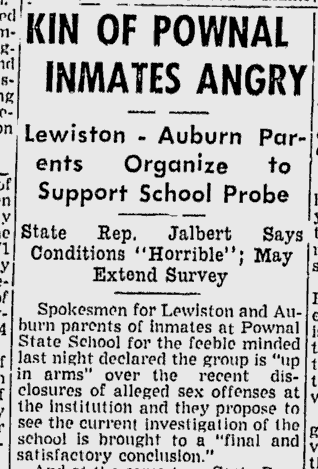In 1954, a group of parents formed a support and advocacy group: Pownal Parents and Friends. Membership quickly grew to more than 300.
The first president Edward J. Berman of Portland said the group formed, in part, because so few people knew anything about issues at Pownal and because “many parents had a feeling or sense of shame over the fact they were parents of children there.”
Over the years, many parents had been told to take their disabled children to the institution and to forget about them. Some did. Others visited regularly, although Pineland did not always make that easy or encourage it.
It was time, they believed, to bring problems and concerns into the open and for family members to join to advocate for their children.
The parents’ group raised money for facilities improvements and to provide items and services for residents. They also were vocal advocates for Pineland at the Legislature and elsewhere.
When the news of abuses came to light in October of 1954, these parents were horrified, and began to organize towards investigating further and improving conditions for their children and family members living in Pownal.

Among the most active members were Walter and Louisiana Soucy of Lewiston, both shoe workers, whose son was at Pineland. In 1967, the Pineland gymnasium was dedicated and named for Walter Soucy.
Assisting the residents, the Soucys said, was “their life.” Until their deaths in the early 1970s, much of their non-working time was devoted to their son and others at Pineland.
Another organization, Volunteers of Pineland, raised funds to create Tall Pines Day Camp in Poland, which operated from the late 1960s through 1992 as a day camp for Pineland residents and for others with developmental disabilities. It was deeded to Special Olympics Maine in 1993.
These groups and others like it would form the basis of the community care system in Maine. In the late 1950s and 1960s, parents in a number of Maine communities, including central Aroostook County, Bath, Wells, and Brunswick formed organizations to provide activities and education for their children with developmental disabilities. Many of the groups still exist and now provide a wide variety of housing and programming for persons with developmental disabilities.
Community-instigated programs helped to increase the visibility of persons with developmental disabilities – and understanding of the needs for services. But not all parents were happy about the idea of community-based services. Some thought improving the institution might be a better choice than the unknown of community-based options. Their concern mirrored those of staff and others about the role of and need for institutions.
